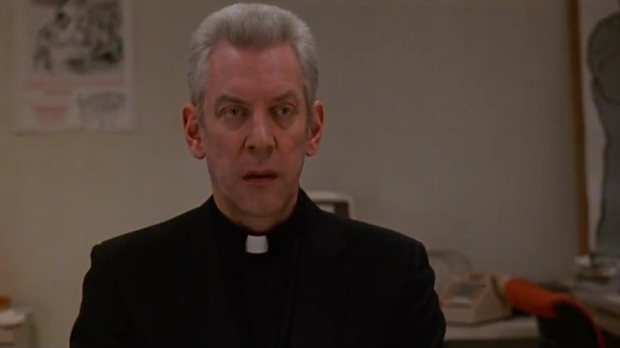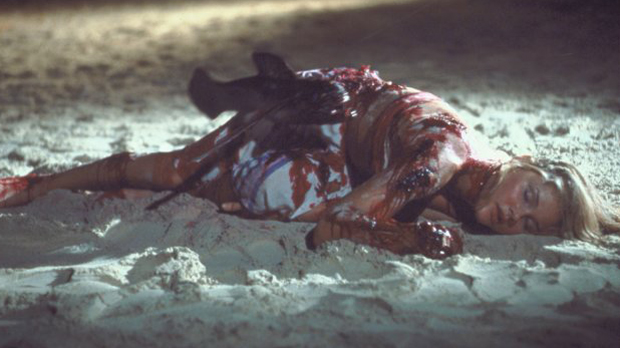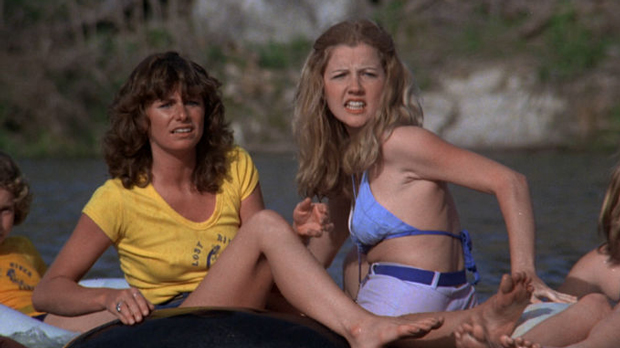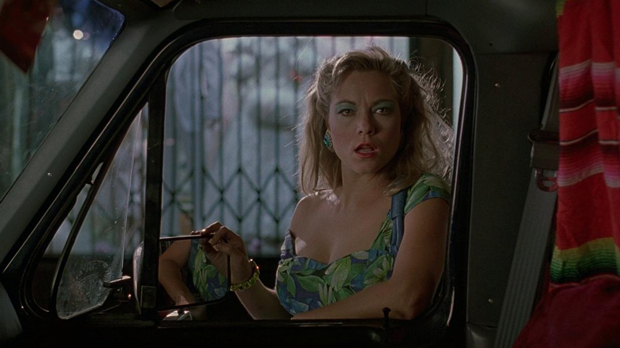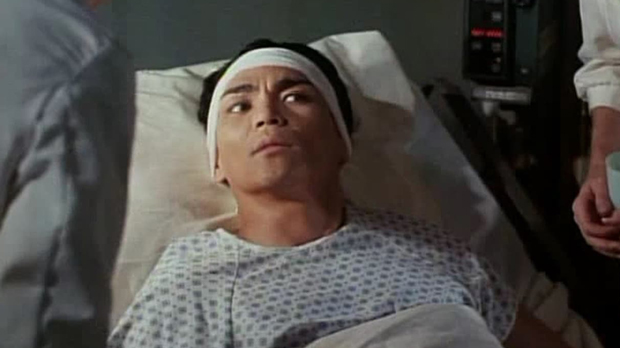 The Rosary Murders (1987) New Line/Suspense-Thriller RT: 105 minutes Rated R (language, violence, mature themes) Director: Fred Walton Screenplay: Elmore Leonard and Fred Walton Music: Bobby Laurel and Don Sebesky Cinematography: David Golia Release date: September 1987 (US) Cast: Donald Sutherland, Charles Durning, Belinda Bauer, Josef Sommer, James Murtaugh, Leila Danette, Addison Powell, Kathleen Tolan, Tom Mardirosian, Anita Barone, John Danelle, Anna Minot, Lupe Ontiveros. Box Office: $1.7M (US)
The Rosary Murders (1987) New Line/Suspense-Thriller RT: 105 minutes Rated R (language, violence, mature themes) Director: Fred Walton Screenplay: Elmore Leonard and Fred Walton Music: Bobby Laurel and Don Sebesky Cinematography: David Golia Release date: September 1987 (US) Cast: Donald Sutherland, Charles Durning, Belinda Bauer, Josef Sommer, James Murtaugh, Leila Danette, Addison Powell, Kathleen Tolan, Tom Mardirosian, Anita Barone, John Danelle, Anna Minot, Lupe Ontiveros. Box Office: $1.7M (US)
Rating: **
The Rosary Murders is like a made-for-TV movie the makers decided at the 11th hour to release theatrically instead on the off chance the moviegoing public would be willing to shell out money to see a movie they could conceivably watch at home. Yes, it carries an R rating, but it’s not all that violent and the only sexual content is references to incest. All the makers had to do to achieve an R was insert a few f-bombs in one scene and viola! Of course, this is all hypothetical. I don’t know what went on during and after production on The Rosary Murders. All I know is that it’s an incredibly mediocre mystery about a series of murders within the Catholic Church.
You’d think a screenplay with crime writer Elmore Leonard’s (52 Pick-Up, Rum Punch) name on it would be something special, right? In the case of The Rosary Murders, you’d be dead wrong. It’s as standard and nondescript as they come. There’s a killer going around murdering priests and nuns. His calling card is a black rosary he leaves in his victims’ hands. The murders take place during Lent. Nobody knows who’s responsible until the killer admits to his sins to Father Koesler (Sutherland, Eye of the Needle) during Confession. This puts Koesler in a real quandary. Should he break the confessional seal and tell the investigating detective, Lt. Kosnicki (Sommer, Witness), what he knows thereby saving the lives of future victims? Or should he honor his vows and keep quiet? What Koesler does is play detective to discover the identity of the killer who dropped a few clues during his confession. Helping him is the reporter, Pat Lennon (Bauer, RoboCop 2), doing the story for the local press.
It would be wrong to call The Rosary Murders a mess. It’s not the right word. “Incomplete” is more accurate. In fact, it hits the proverbial nail right on the head. For example, the subplot about the reporter is dropped about midway through without much of an explanation. She disappears too, but not before the idea of mutual attraction between her and Koesler is brought up. Come to think of it, dropping this particular story element is really more of a cop-out.
Here’s something else. Early on, director Fred Walton (April Fool’s Day) introduces a clash in styles between Koesler and another priest, Father Nabors (Durning, When a Stranger Calls*). Nabors is a traditionalist while Koesler is more liberal. This could have been interesting, but Walton doesn’t do much with it beyond a few scenes of the two priests arguing points of Catholicism.
I have no complaints about the acting. The Rosary Murders has a decent cast. They give good if unexceptional performances. You can tell Sutherland and Durning are just there for a paycheck. In any event, they carry out their acting duties like professionals. It’s the screenplay and the director that lets them down. The story is very routine. It’s fairly predictable except in regard to the killer’s identity and motive. That’s only because he/she isn’t introduced as a character until after Koesler uncovers his/her identity. As for motive, let’s just say it’s not as shocking as the movie would like it to be. The direction is rather uninspired. Walton fails to make it a gripping, edge-of-your-seat mystery. At best, it’s mildly interesting.
I didn’t see The Rosary Murders at the movies. I remember it playing in theaters, but none of them were convenient for me. I saw it on video a few months later. That’s all I remember about it. It left no impression on me either way. There isn’t any graphic violence or crazy Omen-like deaths although the score would lead you to believe that’s the kind of movie it is. It doesn’t work as a serious examination of Catholicism or Catholic guilt. It’s rather superficial actually. I don’t know how good a read William X. Kienzle’s original novel is, but the movie adaptation isn’t a good watch. It’s instantly forgettable.
* = TRIVIA TIDBIT: When a Stranger Calls (1979) was also directed by Walton.
